How To Stop A Puppy From Barking In His Crate At Night?
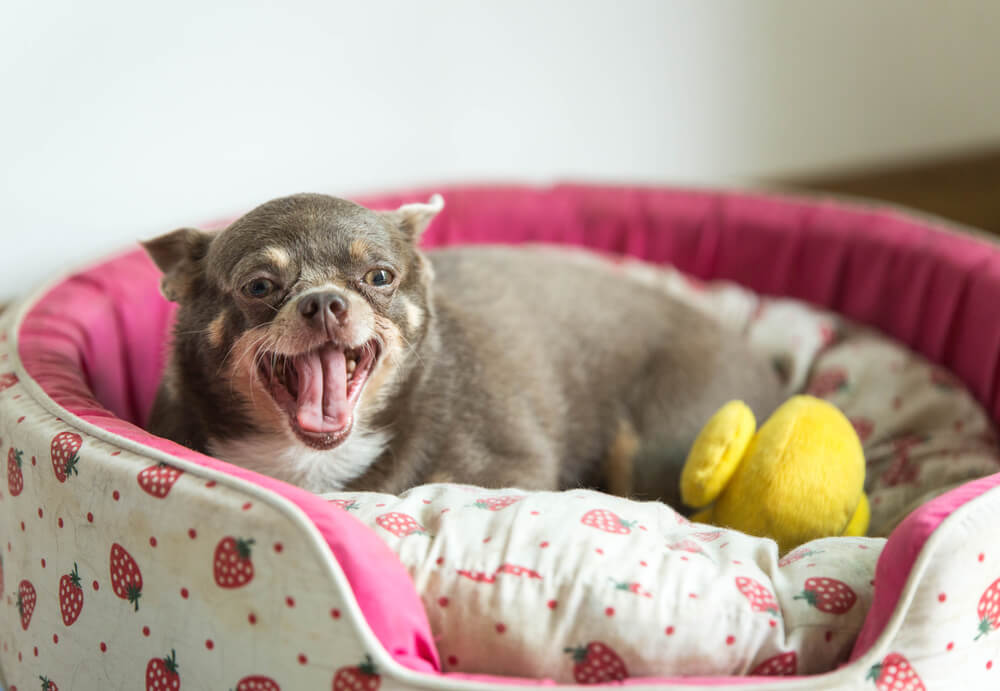
Table of Contents
Listen To The Article
Introduction to How To Stop A Puppy From Barking In His Crate At Night
The first thing to understand about your puppy’s barking is that it’s completely normal, and the second thing is that it’s not a big deal.
In fact, your pup is probably enjoying the attention.
If your puppy is confined to a crate at night, he probably wants to interact with you.
A puppy barking in his crate at night is a common problem with many dog owners.
This problem has been plaguing dog owners for a long time and most people who own dogs would love to have a dog that doesn’t bark excessively.
Dogs that bark excessively can be very annoying.
The reason why dogs bark in their crates is they are barking at the world around them.
They normally have a tendency to bark when they are left alone.
Keeping a puppy quiet at night is something most puppy owners grapple with at one time or another.
This is because puppies are known to bark or whine when they are kept in their crates at night.
This can be a real problem since dogs can wake up their owners and other pets in the household.
Many puppy owners find it challenging to get their puppies to stop barking in their crates at night.
Often, they will begin to bark when they are left in the crate, possibly due to boredom or anxiety because puppies spend most of their first year of life in their mothers’ care, they often feel anxious when left alone during the night.
So what can you do to keep your puppy from barking in his crate at night?
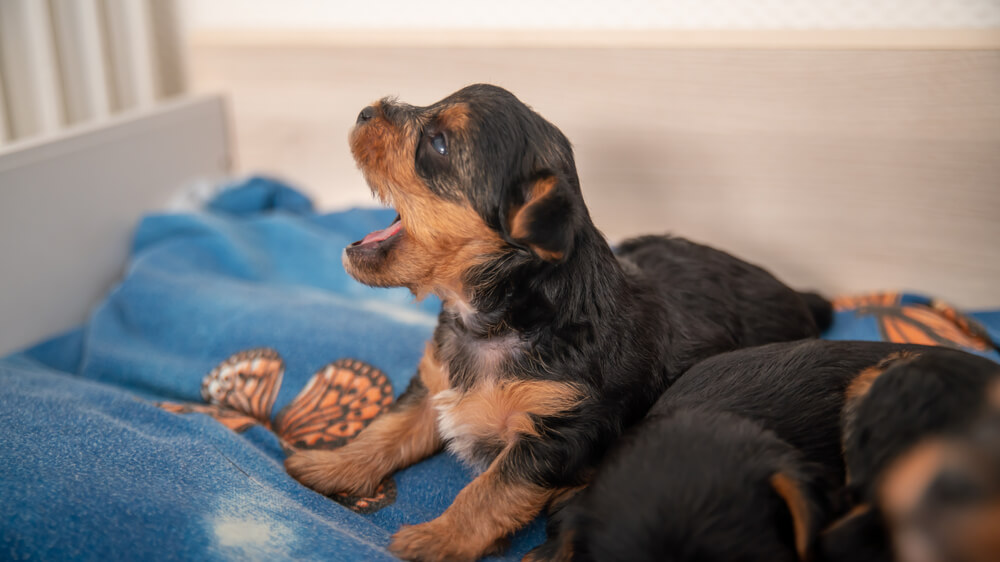
Why Is Your Dog Barking At Night?
First things first, how did your dog pick up this frustrating, sleep-depriving habit?
Dogs bark and whine for a variety of different reasons, most frequently to alert the family to a disturbance, out of anxiety or fear, or for attention.
Dogs become bored easily when they have nothing to do and will make their own fun.
Barking at every sound they hear, joining in with the neighbor dogs in a group barking session, or just barking to let out energy are all reasons behind night barking.
Dogs are very social animals, and they can become lonely when left outside alone at night.
Howling is one way dogs’ express loneliness, but they can also bark incessantly to try and gain human attention.
Isolation distress anxiety around being left alone and confinement distress anxiety around being inside of a crate can play a major role in barking at night but, for many dogs, the problem is simply one of the following:
- At one time you allowed your dog to sleep in the bed but have revoked the privilege;
- You’ve recently adopted your pup and they have not yet learned to sleep through the night;
- You’ve attempted to soothe your dog’s barking by going to them and petting them or freeing them from a confined space.
- Dogs often bark when they are unsupervised.
This is also true when you let your dog outside at night.
Even in a fenced yard, the night is full of strange and interesting sounds that your dog may be curious about, afraid of, or just want to make sure you’re aware of.
When you go to your dog to quiet or soothe them when they bark at night, you are teaching them that barking and whining brings you running.
And once they learn that lesson, it’s a hard one to forget.

How To Stop Your Dog Barking At Night?
So now what?
There is a solution to this problem but you’re not going to like it.
In order to stop a dog from barking and whining for attention at night, you have to convince them that barking and whining will not bring you to them.
You must convince your dog that barking and whining will get them absolutely nowhere.
In other words, to fix this problem, you have to ignore it.
The key is to not respond, don’t go to your dog, don’t call out soothing words or holler at them, don’t let them out of their confined space.
If you comfort your dog even once, you give them a reason to believe that barking sometimes gets them what they want.
If they get what they want some of the time, they have no reason to change their behavior.
If your dog is not rewarded with attention for barking and whining at night, they have no reason to whine and bark at night; they eventually will stop the behavior because their strategy no longer brings you.
Then, teach your puppy to love her crate.
Many puppies will initially react to a crate as if it’s puppy jail, because, in your dog’s eyes, the crate is a hindrance to reaching the fun things she enjoys, like people, toys, play, and freedom.
It is important to introduce the crate to your puppy as a happening place where she gets good things like attention, play, treats, or meals.
Teach your puppy to love her crate by making it part of her daily routine.
Offer treats or indestructible toys in the crate; while your puppy is inside, close the door for short periods.
Do this regularly throughout the day to get her used to being in the crate.
Make your puppy’s crate a peaceful, soothing place to be.
Pheromone spray can help to keep your puppy calmer when she’s in her crate.
Items with the scent of the puppy’s previous home or with your scent may also help toys.
For many pups, soft classical music or dog-formulated music.
A lightweight blanket draped over the top of the crate can help reduce the distraction of people moving around outside the crate and may help your puppy relax.
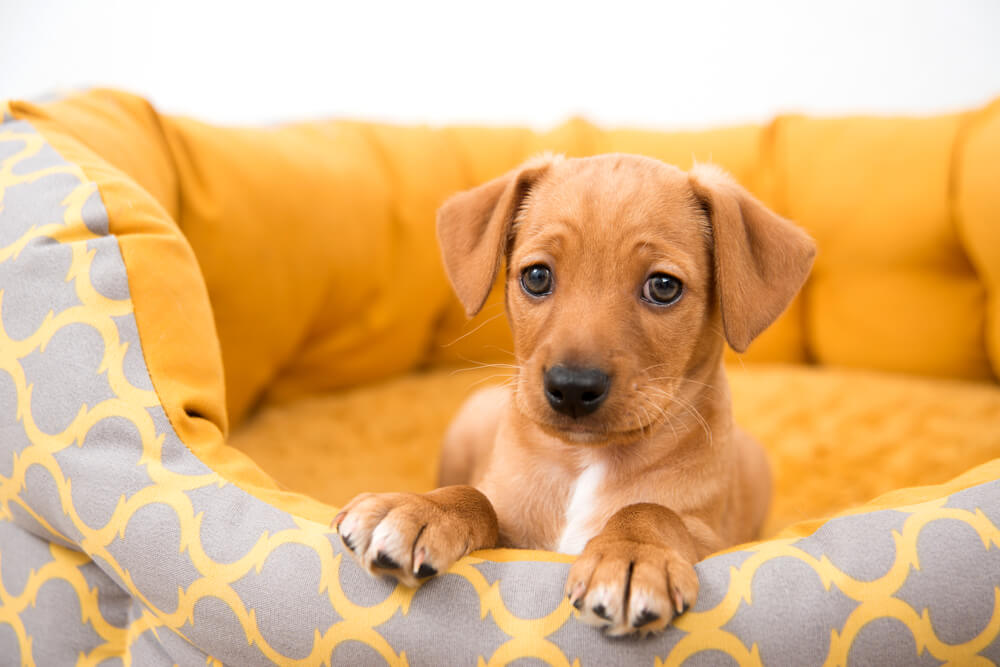
Not Respond Method
Ignore the barking Don’t talk to them, don’t touch them, don’t even look at them; your attention only rewards them for being noisy.
When they finally quiet, even to take a breath, reward them with a treat, to be successful with this method, you must be patient.
Convincing your dog otherwise
Training your dog to not bark in their crate means convincing them that the action brings no rewards. this means no patting and no treats when they are vocalizing in a negative manner while in the crate.
Don’t call out
Along with not responding through petting or any other type of face-to-face contact is to not shout from the other room, either.
Calling out an order sometimes seems as though you are joining in, encouraging your pup to bark louder.
Music to the ears
If you have a pooch who is insisting on barking while in the crate, respond from afar by piping relaxing music into the room where they are crated.
This may provide a distraction and will also drown out the sound for you so that you can be firmer in your resolve.
White noise
Your dog may be barking at the sounds they hear in the street or outside the window.
White noise is a solution used in many circumstances as a way to drown out the unwelcome sound give your dog a quieter space by running a fan or humidifier in the room.
Dog appeasing pheromones
The natural way that some pet parents calm a barking dog.
After all, your pup is barking for a reason. Buy an infuser and plug it in near your pooch’s crate.
The Dog appeasing pheromones may provide a calming sensation for your dog.
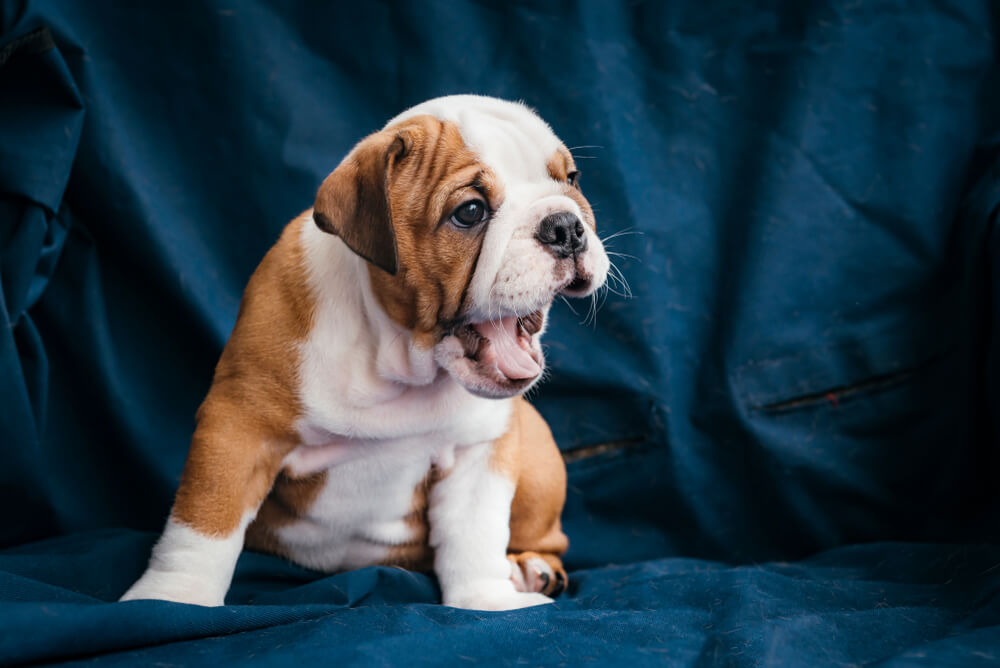
Never Punish Your Dog For Barking In The Crate
At night, your puppy is barking and whining in their crate, you’re bound to be a bit annoyed.
It’s tempting to yell at your puppy or turn to aversive training methods, but that’s always a bad idea.
The problem with punishments is that they deceptively create a “quick fix”.
Your puppy might quiet down for a few minutes but they’ll still feel scared and alone, yet unable to express that.
This also means the puppy may continue to bark when nobody is home to punish them.
You want your puppy to feel safe and secure so they don’t even want to bark.
When the crate is a part of their nighttime routine, they’ll start to fall asleep within minutes of going inside for the night.
If they love their crate, they’ll happily nap when you’re not home, instead of barking the whole time.
Force-free crate training means your puppy will not be afraid to bark if they have to go pee, if someone breaks into your home, or if there’s otherwise something wrong.
Your puppy will sleep peacefully in their crate because they feel safe and secure, and they have learned that they can trust you to be there when they really need you.
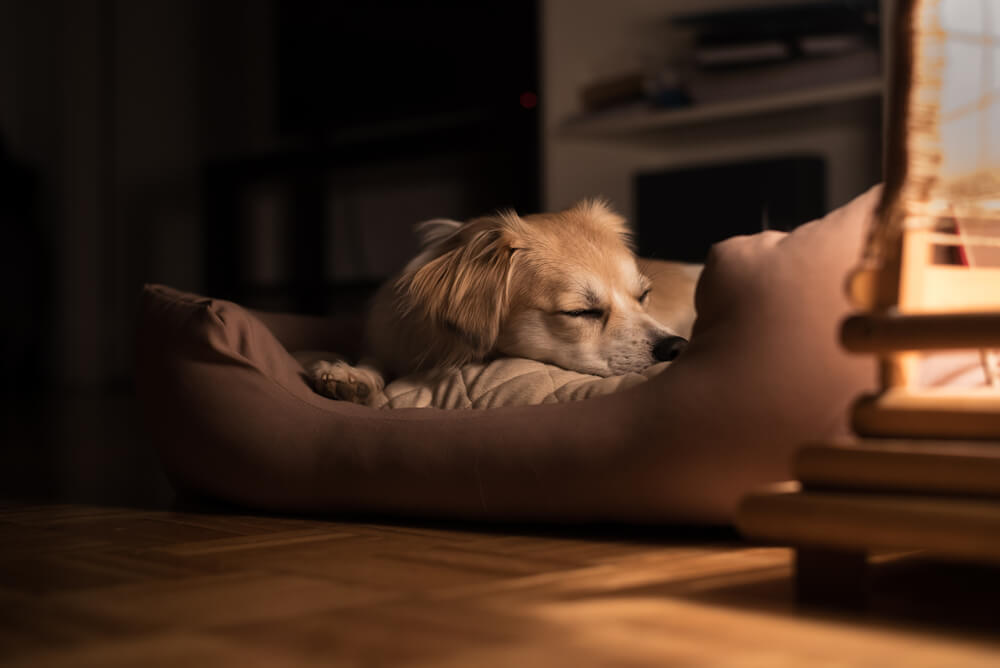
Prepare Your Puppy Crate
Your puppy’s crate will be their safe haven.
Line it with a bed that is thick enough to keep your puppy from sinking to the bottom.
Furnish it with enough blankets for your puppy to burrow. You may want to use old towels if you’re concerned about chewing or poop accidents.
Crates are valuable tools for poop training because pups typically do not go poop in them if the crate is set up correctly.
The crate should be large enough for your puppy to stand, turn around, and stretch out, but not so big that they will use one side as a restroom.
Most crates come with dividers to make the interior space smaller, then you can make it larger as your puppy grows.
You can use a crate cover or blanket to block out light and sound.
Crate training a puppy takes time and patience.
Add in trying to help your puppy sleep through the night in their crate, the whole experience can feel much more frustrating!
Even if your puppy is doing well eating their meals or taking daytime naps in their crate, sometimes sleeping in their crate at nighttime seems like a whole new ballgame.
You don’t want your new puppy to feel isolated and start to whine because they’re in distress.
Their whole world has changed in a big way while they used to sleep in close quarters with their littermates, now they’re sleeping alone in a crate.
Having their crate in or near your own bedroom can help them feel more secure.
Placing a Snuggle Puppy inside the crate can also help calm a puppy getting used to sleeping on their own, as it mimics having a littermate’s warmth and heartbeat close by.
Having them closer to where you sleep also makes soothing them during the night easier.
The flip side is that your puppy’s sleep might be disturbed by lots of movement or activity in the room.
Try placing their crate in a quiet corner or a separate, less active room.
You can also keep their crate near where you sleep at night, but set up a fan or sound machine to help muffle any noises that might interrupt your puppy’s rest.
That way, your puppy will be able to sleep peacefully inside, even during the day.



